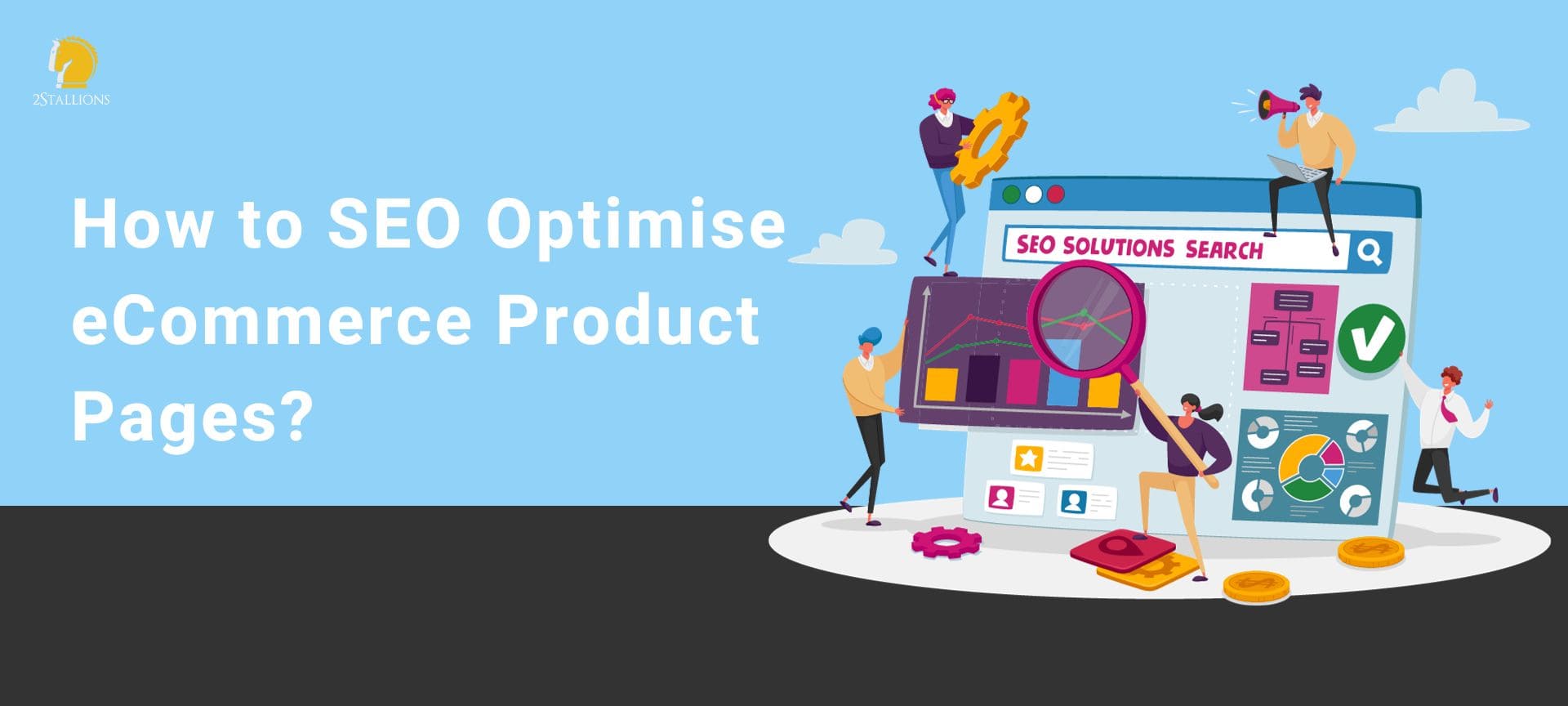SHARE

In the highly competitive world of eCommerce, it is crucial to ensure that your product pages are optimised for search engines. With the right SEO strategies in place, you can significantly improve your online visibility, attract more potential customers, and ultimately boost your sales. In this article, we will delve into the importance of SEO for eCommerce and explore key elements that can help you optimise your product pages effectively.
[thrive_leads id=’3729′]
Understanding the Importance of SEO for eCommerce
SEO, or Search Engine Optimisation, is vital in driving organic traffic to your eCommerce website. By optimising your product pages for search engines, you can rank higher in search results, making it easier for potential customers to find you. Higher rankings increase your visibility and establish trust and credibility among your target audience.
But what exactly is SEO, and why is it essential for eCommerce businesses? SEO is the practice of optimising your website and its content to improve its visibility in search engine results pages (SERPs). When a user searches for a specific product or service, search engines like Google use complex algorithms to determine which websites are most relevant and authoritative. By implementing SEO techniques, you can increase your chances of appearing on the first page of search results, where the majority of users tend to click.
The Role of SEO in Online Sales
When it comes to online sales, visibility is everything. In today’s digital age, competition is fierce, and having a well-optimised website can make all the difference. By utilising SEO techniques, you can improve your website’s ranking, increasing its visibility. According to a study by BrightEdge, 75% of searchers never click past the first page of results. Therefore, you must optimise your product pages for SEO to capture their attention and drive conversions. Imagine you have an eCommerce store that sells handmade jewellery. You have many beautiful necklaces, bracelets, and earrings to showcase to potential customers.
However, if your website doesn’t appear on the first page of search results when someone searches for “handmade jewellery,” chances are they won’t even know your store exists. This is where SEO comes in. By optimising your product pages with relevant keywords, creating high-quality content, and building backlinks, you can increase your chances of ranking higher in search results and attracting more visitors to your website.
How SEO impacts your eCommerce visibility
SEO impacts your eCommerce visibility in multiple ways. First and foremost, it helps search engines understand the relevance and quality of your content, making it easier for them to index your product pages. When you optimise your website with relevant keywords, search engines like Google can better understand what your website is about and match it with relevant search queries. This increases the chances of your website appearing in search results when someone is looking for your products or services.
Moreover, SEO ensures that your website is easily navigable and user-friendly, resulting in a positive user experience. When users visit your website and find it easy to navigate, find the information they need, and make purchases without any hassle, they are more likely to stay longer and explore other pages. This, in turn, encourages visitors to spend more time on your site, decreasing your bounce rate and improving your search engine rankings.
Let’s go back to our handmade jewellery store example. Imagine a potential customer lands on your website after searching for a “handmade silver necklace.” If your website is well-optimised and provides a seamless user experience, they will be more likely to explore other pages, such as your collection of bracelets or earrings. This not only increases the chances of making a sale but also improves your website’s overall visibility and authority in the eyes of search engines.
SEO is a crucial aspect of any eCommerce business. By optimising your product pages for search engines, you can increase your visibility, attract more organic traffic, and ultimately drive more sales. So, investing in SEO is essential if you want your eCommerce website to succeed in the competitive online marketplace.
Elements of an SEO-Optimised Product Page
Now that we understand the importance of SEO for eCommerce, let us explore the key elements of an SEO-optimised product page. When it comes to creating an SEO-optimised product page, there are several key elements that you need to consider. These elements help improve your search engine rankings and enhance your website’s overall user experience.
Product Titles and SEO
Your product titles play a crucial role in SEO optimisation. They should be descriptive, concise, and contain relevant keywords. Including keywords that accurately reflect your product increases the chances of your page being ranked higher in search results. When crafting your product titles, it is important to balance being informative and engaging. You want to provide enough information to entice potential customers while also incorporating keywords that will help search engines understand what your product is all about. Additionally, it is worth mentioning that each product’s title should be unique. This helps avoid duplicate content issues and allows you to target different keywords for different products, thereby expanding your reach in search results.
Importance of Meta Descriptions
Meta descriptions provide a brief summary of your product page in search results. These snippets not only entice users to click on your page but also influence search engine rankings. Therefore, it is essential to craft compelling, keyword-rich meta descriptions that accurately represent the content of your product page. When writing meta descriptions, it is important to keep them concise and informative.
Aim for around 150-160 characters to ensure your description is displayed on search engine result pages. Including relevant keywords in your meta descriptions can also help improve your page’s visibility in search results. Remember, meta descriptions serve as a mini advertisement for your product page. So, highlight your product’s unique selling points and create a sense of urgency or curiosity to encourage users to click through to your website.
Image Optimisation for SEO
Images are a vital component of eCommerce product pages. They not only showcase your products but also have the potential to impact your SEO efforts. Optimising your images can improve your website’s loading speed and enhance user experience, leading to better search engine rankings. When optimising your images for SEO, there are a few key factors to consider. Firstly, it is important to use descriptive file names that accurately reflect the image’s content. This helps search engines understand the image and improves its chances of appearing in relevant image search results.
In addition to descriptive file names, alt tags are crucial for image optimisation. Alt tags provide alternative text displayed when an image cannot be loaded. Including relevant keywords in your alt tags can help search engines understand the context of the image and improve its visibility in search results. Lastly, compressing your images without compromising their quality is essential for optimising your website’s loading speed.
Large image file sizes can slow your website, leading to a poor user experience and potentially lower search engine rankings. By compressing your images, you can strike a balance between image quality and website performance. Overall, paying attention to image optimisation can significantly improve your website’s SEO performance and enhance the visual appeal of your product pages.
Implementing Keyword Research for Product Pages
Keyword research is a fundamental aspect of SEO optimisation for eCommerce product pages. It plays a crucial role in driving organic traffic and improving the visibility of your products in search engine results. When it comes to keyword research, it is essential to understand the language your target audience uses when searching for products similar to yours.
By identifying the right keywords and incorporating them strategically into your content, you increase the likelihood of your product pages appearing in relevant search queries. But why is keyword research so significant? Well, imagine you have a fantastic product that solves a specific problem. However, if you don’t use the right keywords, your potential customers may never find it. That’s where keyword research comes in. It helps you uncover the specific terms and phrases people use to search for products like yours.
The Significance of Keyword Research
Keyword research helps you understand the language your target audience uses when searching for products similar to yours. By identifying the right keywords and incorporating them strategically into your content, you increase the likelihood of your product pages appearing in relevant search queries. Moreover, keyword research allows you to gain insights into the search volume for specific keywords.
This information helps you prioritise your efforts and focus on the keywords with the highest potential to drive traffic and conversions. Additionally, by analysing the competition level for different keywords, you can gauge the difficulty of ranking for those terms. This knowledge enables you to choose keywords that balance search volume and competition, giving you a better chance of ranking higher in search engine results.
Tools for Effective Keyword Research
Fortunately, various tools are available to simplify the process of keyword research. These tools provide valuable insights into search volume, competition, and related keywords, empowering you to make informed decisions and optimise your product pages effectively.
One popular tool is the Google Keyword Planner, which allows you to discover new keywords, analyze their search volume, and get ideas for related terms. It provides data directly from Google, giving you a reliable source of information. Another powerful tool is SEMrush, which offers comprehensive keyword research capabilities. It not only provides search volume and competition data but also allows you to analyze your competitors’ keywords and discover new opportunities.
Moz Keyword Explorer is another tool worth mentioning. It provides in-depth keyword analysis, including search volume, difficulty, and organic click-through rates. With its user-friendly interface and robust features, it is a valuable asset for any SEO practitioner. By leveraging these tools, you can save time and effort in your keyword research process. They provide valuable data and insights, enabling you to make data-driven decisions and optimise your product pages for maximum visibility and organic traffic.
The Role of User Experience in SEO Optimisation
User experience is an integral part of effective SEO optimisation for eCommerce product pages. Providing a seamless and enjoyable experience for users increases their satisfaction and is crucial in improving search engine rankings. Let’s delve deeper into the various aspects of user experience that impact SEO.
Site Speed and its Impact on SEO
Site speed is a critical factor in user experience and SEO rankings. Slow-loading product pages can frustrate users and lead to higher bounce rates. Imagine a potential customer eagerly waiting for a product page to load, only to lose patience and abandon the site. To ensure optimal site speed, it is crucial to employ various strategies.One effective strategy is to compress images without compromising their quality. By reducing the file size of images, you can significantly improve page loading speed.
Minimising HTTP requests by combining CSS and JavaScript files can enhance site performance. Leveraging browser caching is another technique that allows users to store certain elements of your website, reducing the need to download them again when revisiting the page. Moreover, optimising the server response time and using content delivery networks (CDNs) can help distribute the load and deliver content faster to users in different locations. These techniques not only enhance user experience but also contribute to better SEO rankings.
Mobile Optimisation for Better SEO
Optimising your product pages for mobile devices is imperative in today’s mobile-first world. With the increasing number of people using smartphones and tablets to browse and shop online, neglecting mobile optimisation can harm user experience and SEO rankings. Responsive design is a fundamental aspect of mobile optimisation. It ensures that your website adapts seamlessly to different screen sizes, providing users with a consistent and user-friendly experience across devices.
By employing responsive design, you eliminate the need for users to zoom in or scroll horizontally, making navigating and engaging with your product pages easier. Fast page loading is another crucial factor in mobile optimisation. Mobile users often have limited patience and expect instant access to information. Optimising images, leveraging browser caching, and minimising HTTP requests, as mentioned earlier, are all strategies that contribute to faster page loading on mobile devices.
Furthermore, simplifying navigation on mobile devices is vital for improving user experience. Ensuring that menus are easy to access and use and that important information is readily available can significantly affect how users interact with your product pages. By providing a seamless mobile experience, you enhance user satisfaction and boost your SEO rankings.
User experience plays a pivotal role in SEO optimisation for eCommerce product pages. By prioritising site speed and mobile optimisation, you can create a user-friendly environment that delights your customers and improves your search engine rankings. Remember, a positive user experience is the key to unlocking the full potential of your SEO efforts.
Monitoring and Improving Your SEO Strategy
Implementing effective SEO strategies is not a one-time task. Monitoring and improving your SEO efforts is crucial for maintaining and enhancing your online visibility.
Regular Auditing of Product Pages
Regularly auditing your product pages allows you to identify areas for improvement and fix any issues that may negatively impact your SEO performance. It involves analysing your keywords, meta tags, content quality, and overall site structure. By conducting regular audits, you can ensure that your product pages remain relevant and optimised for search engines.
Keeping up With SEO Trends and Updates
SEO is continuously evolving, with search engines updating their algorithms regularly. It is essential to stay informed about the latest trends and updates in SEO practices. Keeping up with these changes enables you to adapt your strategies accordingly and maintain a competitive edge in the online marketplace.
By following the above guidelines and implementing effective SEO strategies, you can SEO-optimise your eCommerce product pages, enhance your online visibility, and ultimately drive more sales. Remember, SEO optimisation is ongoing, so continuous monitoring and improvement are vital to achieving long-term success.









